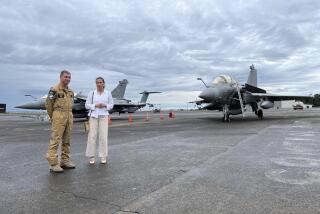Negotiators Hint at New Leases for U.S. Bases : Philippines: Talks are expected to focus on further use of the facilities in exchange for increased economic and military aid.
- Share via
MANILA — Ending a week of often rancorous talks, U.S. and Philippine negotiators agreed Friday to new negotiations on the future of six American military bases in the Philippines, setting the stage for a renewed U.S. military presence in the western Pacific.
Publicly, the negotiators agreed only to a “discussion” of a “new relationship” between Manila and Washington, including political, economic and military matters. But U.S. officials said privately that the talks will focus primarily on creating a new security agreement, including possible new leases for the giant U.S. bases here.
“It’s a euphemism,” one official said of the “discussion” ahead. “It’s a diplomatic term to cover what we got--new negotiations on the bases.”
In exchange, the United States offered to increase military, medical and food aid to the Philippines. The arrangement appeared a face-saving maneuver for both sides since much of the assistance is already promised or in the pipeline.
The facilities at issue are the Pentagon’s two largest overseas installations, Clark Air Base and Subic Bay Naval Base, plus four smaller facilities. Although cuts are now under way, the United States has 14,745 military personnel, 1,355 civilian Department of Defense employees and 20,268 dependents stationed at or near the bases.
No date was set for the next round of talks, but they are expected to begin within a month. President Bush’s special negotiator, Richard L. Armitage, who will lead the talks, left for Tokyo after closing ceremonies in the heavily guarded Central Bank complex.
More than 100 anti-U.S. demonstrators were arrested during the week, which began with the shooting death of two Air Force enlisted men outside Clark. In Angeles, near Clark, Lt. Col. Julius Yarcia, the regional military commander, said Friday that his troops had arrested three alleged Communist guerrillas, one of whom may be involved in the killing of the two Americans, airmen John H. Raven, 19, of Delta Junction, Alaska, and James C. Green, 20, of Craig, Colo. The three were arrested late Thursday after a gun battle with troops in a village on the outskirts of Angeles, about 50 miles north of Manila, said Yarcia.
In Manila early Friday, two rifle grenades were fired from a taxi at the Thomas Jefferson Cultural Center, run by the U.S. Information Service, but there was little damage and no injuries.
U.S. diplomats here were notified this week that they are now entitled to 15% additional “danger pay” for working in the Philippines. Danger pay is also given to U.S. diplomats in Colombia, Peru, El Salvador, Afghanistan and Lebanon.
The negotiators apparently resolved the longstanding dispute over compensation for the bases. Philippine Foreign Minister Raul S. Manglapus had contended that his government is owed $222.5 million from the current 1988 agreement. The U.S. negotiators acknowledged that Congress has yet to appropriate $96 million of the two-year $962 million agreement, but refused to concede any shortfall.
The negotiators agreed to establish monitoring teams to deal with the assistance package, and the United States agreed to seek excess military equipment for the Philippines from bases in Western Europe, provide excess medical equipment from Veterans Administration hospitals in the United States, arrange Export-Import Bank loans and send increased food and medical aid to this impoverished nation of 60 million.
“All these add up to the satisfaction of our $222.58-million shortfall bid,” Manglapus said in the closing ceremonies. U.S. officials declined to put a dollar figure on the package.
But officials privately conceded that creative accounting on both sides helped solve the impasse. About $6 million in excess U.S. hospital equipment was delivered earlier this week, for example, and a $500-million Export-Import Bank loan package announced in Washington this week will cover the Philippines, Indonesia, Pakistan and Thailand. In addition, a Philippine spokesman said $22.5 million in already delivered food aid had been “overlooked.”
Armitage repeatedly expressed “disappointment and frustration” at the tone of the talks, and said Philippine criticism was “direct and pointed.”
“I must admit with a sense of disappointment that the issue of compensation so dominated our time during these talks,” he said.
Saying U.S. support for democracy is more important than aid, Armitage asked, “Of what value are these facilities to the Philippines? If the answer is expressed only in monetary terms, the American military presence cannot be sustained.”
Armitage appeared to direct his comments at Philippine nationalists, who consider the bases a vestige of the U.S. colonial period, from 1898 to 1946, and have pressed President Corazon Aquino to remove or sharply reduce the military presence. The issue is highly volatile here, and is subject to endless public debate.
Despite his tough talk, officials said Armitage is pleased with the compromise. The Pentagon considers the bases vital to protecting sea lanes in the Far East, to projecting air and sea power in the Western Pacific, and to act as a stabilizing balance in the region.
More to Read
Sign up for Essential California
The most important California stories and recommendations in your inbox every morning.
You may occasionally receive promotional content from the Los Angeles Times.














